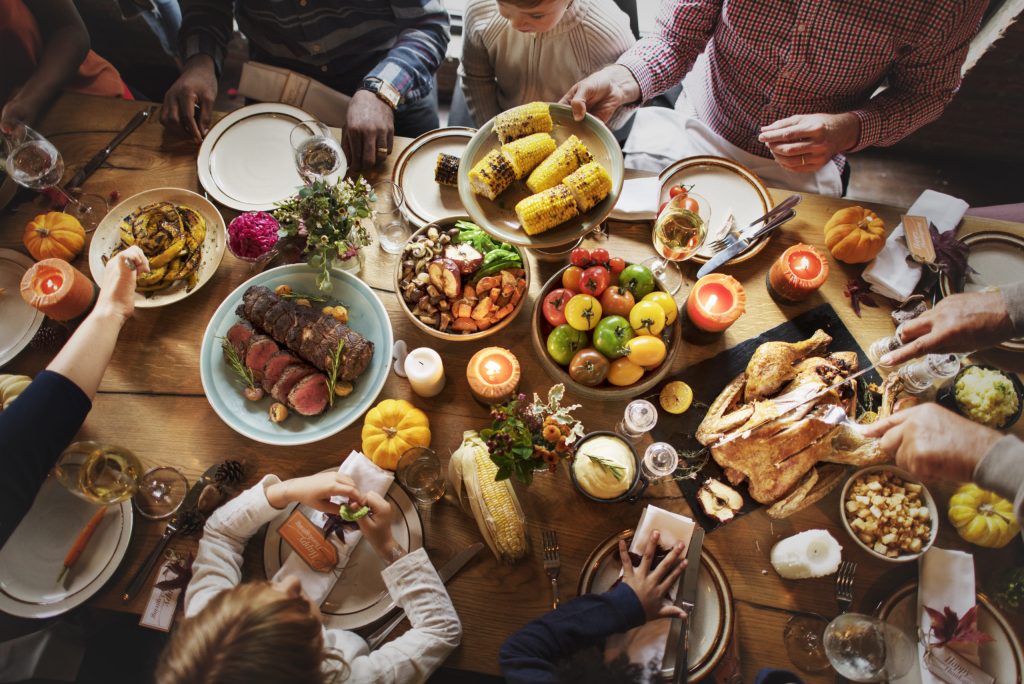Almost every society in history has had a harvest festival.
The Ancient Egyptians held a parade to honor their god of vegetation. The Ancient Israelites observed what is now the Feast of Tabernacles, honoring the Lord’s instruction to hold a “feast of the harvest” with the first fruits of the year’s labors. The Ancient Greeks honored the goddess of agriculture, Demeter, during a three-day festival called Thesmophoria. They marked the celebration with a peculiar ritual, killing a group of piglets, placing their entrails atop an altar, and mixing the remains with seeds in hopes of securing a bountiful harvest.
Thanksgiving is America’s harvest festival. In a world of laptop jobs and factory farms, the “harvest” is now more of a metaphor. But like the pagans, we have our own peculiar rituals. We carve the turkey, watch pro football, argue about politics, and regale with distant relatives.
We celebrate a feast bound up in both biblical thanksgiving and America’s civic irreligion. In the early 20th century, as immigrant Angelo Pellegrini recalled in his book American Dream, teachers assimilated Italian students to American values by reminding them that the Pilgrims fled to America in search of “religious freedom.” Michael Kammen noted that the Pilgrims, rather than the Puritans, were exalted by teachers in the Progressive Era, because the Pilgrims “could not be accused of religious intolerance.” Religious indifference seemed to be the god of America’s harvest.
There were pockets of resistance to the establishment of Thanksgiving as a national holiday. Until the late 19th century, many American Catholics viewed Thanksgiving an essentially Protestant celebration. Southern states associated the holiday with Yankeedom, and resisted its adoption. Nineteenth-century reformers such as Sarah Josepha Hale sought to popularize Thanksgiving by shedding its Protestant roots and tying the celebration to faith and family. The holiday, she wrote, should acknowledge “the grateful hospitality, the obliging civility and unaffected happiness” of family life.
The ecumenical approach won converts, and a feast day once limited to New England and its environs became synonymous with Americana. Paintings of the first Thanksgiving and icons of family meals began to pop up in the late 19th and early 20th centuries, with Norman Rockwell’s Freedom from Want, the New Deal-era painting of an aproned grandmother and a black-suited patriarch behind a roasted bird and before a wide-eyed table of children, becoming the template of the modern-day celebration of Thanksgiving.
Rockwell’s painting, and the appeals to America’s settlers that characterized the 19th-century push to make Thanksgiving a federal holiday, remind us that the American celebration of Thanksgiving is bound up in nostalgia. That nostalgia is rooted in a realization that the slow, simple, agrarian society in which our Pilgrim forebears lived is increasingly out of reach in our dense, urban country. Elizabeth Pleck, a researcher from the University of Illinois, Urbana-Champaign noted that Hale and other 19th-century advocates of Thanksgiving felt that
The growth of commerce, industry, and urban life created a radical break between past and present, a gap that could be bridged by threshold reunions at the family manse. Nostalgia at Thanksgiving was a yearning for a simpler, more virtuous, more public-spirited and wholesome past, located in the countryside, not the city. In gaining wealth, the family and nation, it was believed, had lost its sense of spiritual mission. Perhaps celebrating one special day might help restore the religious morality of an earlier generation.
Subscribe Today
Get weekly emails in your inbox
As such, we mark our harvest by recalling the gratitude and simplicity of the Pilgrims, who ate the food of their land—corn, cranberries, potatoes, and green beans—and gathered with family to give thanks. As they praised their God, so we praise ours—the God of Abraham, if we’re lucky, and “Mother Nature” if we’re not.
We ape the settlers’ prayers of gratitude with acknowledgments of our own good fortune. One by one, we gather around the table to share that for which we are thankful: our health, our families, our abundance. We call to mind our blessings and the plight of our brethren doomed to starvation and squalor, recalling as we share food and drink that they are hungry, and we must give them to eat.
It is that old-time religion—charity to the poor, gratitude for our gifts, Christian simplicity and a purity of heart—that characterizes our Thanksgiving nostalgia. We long for norms and cultural modes that no longer exist in our increasingly urban and digital society. Thanksgiving is a harvest festival, and as we ponder our harvest—the digital and high-tech fruits of our labor—let us commit to turning back the clock, if only for a day.











